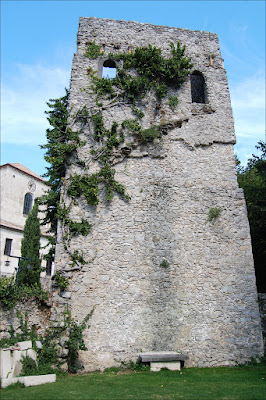Reprinted from Cav. Charles Sant'Elia's Meridiunalata / Southernade, an evocative bilingual collection of poetry written in Neapolitan and translated to English between 1989 and 2010.*Ncuorp’’o Caudo D’’A Notte
Ncuorp’’o caudo d’’a notte
Se ne traseva ‘o friddo
‘E sta luna nova.
Niente s’è smuóppeto.
‘O graro de l’autare
Nce aspettava,
Nu puojo sulagno
Mmiez’’e parole
Ca sagliéveno a cefrone
Addò ghiéveno jéveno.
Ammarrávemo ‘e feneste
Int’’o sbacante,
Ogne lagnanza d’ammore
Scordata e passata
Se steva zitta.
Era ‘o tiempo d’’e canzone nove,
‘O dimane c’’a’ fine
Era venuta mbracci’a nuje.
Inside The Warmth of the Night
Inside the warmth of the night
The cold of this new moon
Was entering.
Nothing moved.
The step of the altar
Was awaiting us,
A solitary ledge
Between the words
That were rising up like chevrons
Wherever they went.
We shuttered the windows
In the void,
Every complaint of love
Forgotten and passed
It was quiet.
It was the time of new songs,
The tomorrow that in the end
Had come into our arms.
* Self-published in 2010, Meridiunalata / Southernade is a treasury of poems gleaned from Cav. Sant'Elia's previous collections (Nchiuso dint''o presente, 'A cuntrora, and 'O pino e l'éllera), which were circulated among friends in New York City and Naples. Special thanks to Cav. Sant'Elia for allowing us to reprint his poetry and translations.



























































